For strength-training enthusiasts, having one of the best barbells in your home gym is a must. This iconic tool of the trade, though, can come in more specialized forms to help you make the most of certain lifts. The best trap bars, for example, can be a great alternative for deadlifts and carries thanks to their common hexagonal shape, weight distribution, and accommodating body positioning that can help take some strain off your lower back. (1)
Like any piece of fitness equipment for your home gym, though, you’ll need to be mindful of a bar’s key components and how they can influence your workouts. Factors including the bar’s weight capacity, handle positioning, knurling style, and interior space can all influence your lifting prowess. To help make chasing those PRs a more accomplishable fitness goal, we got hands-on with dozens of popular trap bars and consulted with our in-house team of experts to compile this round-up of our favorite trap bars on the market today.
The 10 Best Traps Bars of 2026
- Best Trap Bar Overall: REP Fitness Open Trap Bar
- Best Trap Bar with Elevated Handles: Bells of Steel Open Trap Bar/Hex Bar 3.0
- Best Rackable Trap Bar: Titan Fitness Rackable Hex Trap Bar V3
- Best High-End Trap Bar: Eleiko Öppen Bar
- Best Trap Bar for Carries: PRx Performance Olympic Hex Bar
- Best Trap Bar for Deadlifts: Titan Fitness Open Trap Bar
- Best Multi-Grip Trap Bar: Kabuki Strength Trap Bar HD
- Best Budget Trap Bar: CAP Barbell Olympic Trap Bar
- Best Hex-Style Trap Bar: Rogue Fitness TB-2 Trap Bar
- Best Open-Style Trap Bar: GIANT Northland Open Trap Hex Bar
Overall Best Trap Bar: REP Fitness Open Trap Bar
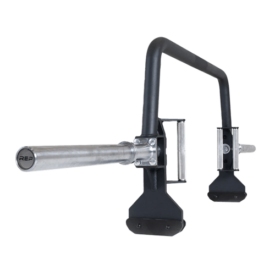
The REP Fitness Open Trap Bar offers a high weight limit of 1,350 pounds, a built-in jack for easy loading and unloading of weights, and it's a rackable trap bar — meaning you can use it with your existing squat rack or power rack.
Specs
- Price: Starting at $399.99
- Weight: 58.4lbs
- Weight Capacity: 1,350lbs
- Sleeve Length: 16.5”
- Interior Space: Starting at 23”
- Knurling: Full
Pros
- A 16.5-inch loadable sleeve length and 1,350-pound max weight capacity helps ensure you can train to your heaviest desires.
- This REP offering includes a built-in deadlift jack for easier plate loading before your next set.
- The handles are removable, which turns the profile into a cambered bar for squats.
Cons
- Our tester did begin to notice some barbell sway after trying to lift the Open Trap Bar with loads over 500 pounds.
- The knurling is more medium-grade, meaning those wanting aggressive traction may feel underserved across the handles.
For those wanting a premium fitness trap bar with all the bells and whistles and none of the financial strain, this REP Fitness Open Trap Bar can be just the ticket. For one, you can choose your distance between the handles, from a 23-inch narrow setup up to a wider 27.3-inch setup. Plus, the open design can make getting into position a breeze, and the built-in deadlift jack can assist in with the sliding on of bumper plates.
Our tester rated the features at 4.5 out of 5, speaking highly of the variety of handle setups available with this hex bar. “I love that you can customize your grips at the time of purchase for more or less room in between the units,” they added. “Additionally, REP offers all of their handle styles as potential add-ons, meaning you can swap out your grip setups with each training session.”
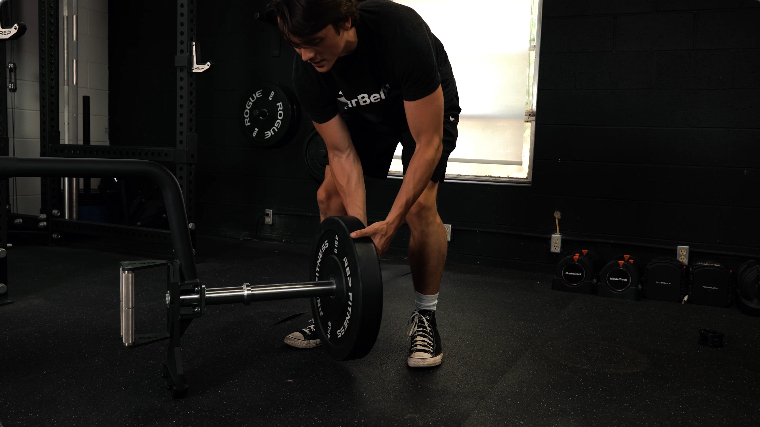
In addition to the handles, this open-style trap bar can also be used for cambered squats. REP considered this versatility heavily, as showcased by the center knurling patch across the frame where your neck and shoulder blades would sit in this particular movement. While the knurling along this patch (and the handles for that matter) is a little too conservative for our tastes, we still scored the versatility at 4.5 out of 5.
[Related: Benefits of the Trap Bar Deadlift]
The REP Open Trap Bar also boasts a durable tubed frame that’s rated for weight totals up to 1,350 pounds. However, we did drop our durability score slightly after hands-on testing to a rating of 4 out of 5. “While trying to train with 500 pounds or more, I noticed that this trap bar had a present sway to it,” added our tester. “This could be detrimental for those wanting absolute security and stability during heavy lifts, so I’d proceed with some caution when going for weight totals such as this.”
While the bar itself may begin to falter at higher totals, the loading process is simplified thanks to the built-in deadlift jack across the silhouette. All you need to do is stand the bar upright across the blocks, and you can take advantage of the increased height between your home gym flooring and the barbell sleeves for easier loading.
Read our full REP Fitness Open Trap Bar Review.
Best Trap Bar with Elevated Handles: Bells of Steel Open Trap Bar/Hex Bar 3.0
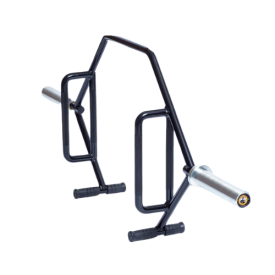
With an open design, built-in bar jack, and elevated handles, this Bells of Steel Open Trap Bar/Hex Bar 3.0 can be an excellent addition to your home gym setup. At less than $300, it’s also one of the more affordable options in the category — roughly $100 cheaper than the $400 average.
Specs
- Price: $299.99
- Weight: 47lbs
- Weight Capacity: 700lbs
- Sleeve Length: 9.7”
- Interior Space: 23.6”
- Knurling: Full
Pros
- The Trap Bar/Hex Bar 3.0 comes with dual handles for a varied grip, including a higher-seated set for easier range of motion across your pulls.
- This Bells of Steel profile comes with a built-in bar jack for easier weight-plate loading.
- A sub-$300 price tag makes this a great budget-friendly option for garage gym enthusiasts — nearly $100 below the average trap bar price.
Cons
- The 700-pound weight capacity is lower than other trap bars, which can typically hold up to 1,000 pounds or more.
- Those lifting with bumper plates can quickly max out the 9.7-inch barbell sleeves.
Having a higher handle placement can help you lift more with a trap bar, as the shortened distance from ground to lockout can allow you to power through your lift with greater ease. For our money, the Trap Bar/Hex bar 3.0 from Bells of Steel is a top pick for facilitating these needs, offering both low- and high-handled options across the open design.
I’ve used this Trap Bar/Hex Bar 3.0 in training previously, and I definitely feel a sense of ease when tackling my normal deadlift working weights. The 28-millimeter handles are easy to grip, and I was appreciative of the medium knurling pattern that was still tacky enough for ample control, even through the black oxide finish.
[Related: Best Trap Exercises]
However, we did have to drop our construction rating slightly for this impressive hex bar, giving it a 4.25 out of 5 for the category given its lower 700-pound max weight capacity. Other open-style trap bars can routinely house up to 1,000 pounds or more. Even if you’re equipped with some of the best bumper plates, we think this hex bar is best equipped with iron weight plates, as thicker bumpers can quickly max out the shorter 9.7-inch sleeves.
Despite this limited weight total, I still scored the versatility at 4.5 out of 5, mostly due to the open-style profile that makes getting into and out of the bar a simple endeavor. Additionally, the open front can also be great for lunging exercises and farmer walks, and the lighter 47-pound bar can also be used for more advanced lifts like seal rows.
Lastly, we graded the value at 4.5 out of 5 thanks to the sub-$300 price tag. Yes, this Bells of Steel Trap Bar/Hex Bar 3.0 is less capable of heavier weights in training, but most athletes will find its 700-pound weight capacity to be plenty. Plus, the entire silhouette is just 59 inches long, meaning storing this high-quality strength training tool is less of a burden — a true benefit for those training in more compact garage gyms.
[Related: Trap Bar Vs. Barbell Deadlift]
Best Rackable Trap Bar: Titan Fitness Rackable Hex Trap Bar V3
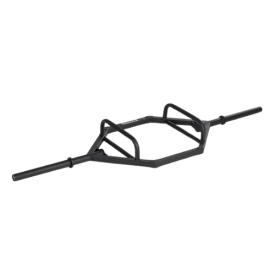
If you’re looking for a trap bar that can fit easily across your power rack’s J-hooks, this Rackable Hex Trap Bar V3 from Titan Fitness is a solid pick. With 16 inches of barbell sleeve at each side, too, you can easily load this profile up for heavy pulls and carries with room to spare.
Specs
- Price: $329.99
- Weight: 60lbs
- Weight Capacity: 800lbs
- Sleeve Length: 16”
- Interior Space: 22”
- Knurling: Full
Pros
- The frame design of this trap bar is wide enough to rest on your power rack’s J-hooks, allowing for shrugs, rack pulls, bent-over rows, and more.
- This trap bar utilizes 16-inch barbell sleeves that can make it easier to load for heavy sets up to the 800-pound max weight capacity.
- The 28-millimeter knurled handles easily mimic the in-hand grip experience you’d feel with a normal barbell, albeit in a neutral hand position.
Cons
- The closed design can make extending exercises like lunges more challenging.
- According to our tester, the black powder coat is very susceptible to scuffs and scratches.
Trap bars that can be placed in a rack can be greatly beneficial for athletes. For one, it can make loading plates onto the sleeves all the more easier — although built-in bar jacks are giving this perk a run for its money nowadays. Additionally, having a rackable hex bar can allow you to set up for varied lift-offs to perform more efficient movements like shrugs, overhead presses, bent-over rows, and more. The Rackable Hex Trap Bar V3 from Titan Fitness has been our go-to for some time when looking to accomplish these in-rack training movements.
[Related: Best Power Racks]
According to our tester, the versatility of this Titan trap bar is unmatched. “I really like the rackable length of this piece, which gives you room to easily set up for rack pulls and other movements,” they said in reference to their 4.5 out of 5 rating for the category. “Plus, the longer barbell sleeves can be great for pushing toward a new PR. I was easily able to fit four bumper plates on each side, and I could’ve probably added a fifth.”
We also appreciated the durability at play with this rackable hex bar, as the integrity has remained consistent across the profile even after years of use in our training warehouse.
However, we did drop our durability rating slightly to 4 out of 5 given the black powder coat. Our tester reported that they’ve yet to see any corrosion or rust, but the thinner finish is highly scratched and scuffed after countless training sessions. If you want your fitness gear to be as pristine as possible, it may be best to softly handle this profile.
The Hex Trap Bar V3 has a closed design, which can be a subjective silhouette depending on your training style. Our tester noted that the extra back framing can be ideal for achieving better balance during carries, but some athletes may feel too cramped along the interior during certain movements. Think about your comfort levels when working out to determine whether you’re best suited with an open- or closed-style trap bar.
[Related: Trap Bar Squat vs Deadlift – What’s the Difference?]
Best High-End Trap Bar: Eleiko Öppen Bar
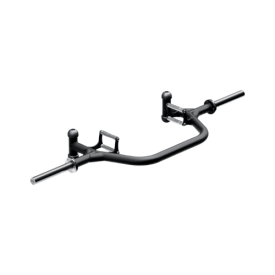
Boasting a heightened sense of craftsmanship synonymous with the brand, the Eleiko Öppen Bar can be another luxe addition to your training space. The Öppen Bar features a built-in bar jack, rounded framing that can facilitate cambered squats, and an impressive weight capacity that totals over 1,100 pounds.
Specs
- Price: $970
- Weight: 55.12lbs
- Weight Capacity: 1,102.31lbs
- Sleeve Length: 12.6”
- Interior Space: 24.61”
- Knurling: Full
Pros
- The Öppen Bar features a built-in jack that can help preserve floors while loading and unloading plates.
- Each set of handles features impressive knurling that’s akin to the brand’s highly-praised IWF Weightlifting Barbell.
- This trap bar comes with an impressive five-year warranty.
Cons
- The handles are not removable, which can lead to some interference when performing cambered squats.
- This Öppen Bar is more than double the $400 average of other high-quality trap bars.
Eleiko is renowned in fitness for making some of the best equipment out there — from barbells and weight plates to even the best barbell collars. It’s no surprise, then, that the brand’s Öppen Bar earns our praise here through its impressive craftsmanship, convenient features that make lifting efficient and enjoyable, and impressive five-year warranty package.
One of the key standouts across this Öppen Bar design is the built-in bar jack with rubberized feet. This technology can be excellent for loading and unloading plates to your desired working total, while the rubber base can do wonders for preserving your home gym floor. Our tester also appreciated how the feet can act as a counterweight during lifts, which can be great for maintaining a sense of balance across the open design.
We also rated the features at 4.75 out of 5 for the Öppen Bar thanks to the multiple handles set at each side. This allows you to choose your handle height in an instant for varied training.
“Plus, I like how Eleiko includes an often-overlooked component across the handle — knurling marks,” added our tester. “These rings can help you find the center of the handle more easily for repetitive grip placement throughout your workouts.”
Speaking of the handles, we also enjoyed the knurling pattern, rating it at 4.75 out of 5. In testing, we found this crosshatched design to resemble Eleiko’s lineup of impressive barbells, providing that ideal sense of comfort and control through each lift. This can be great for athletes wanting to transition between traditional barbell work and trap bar movements, as the in-hand sensations can remain the same without the need for added focus across your palms.
Naturally, though, all of this attention to detail comes at a price. Listed for $970, the Öppen Bar is more than double the $400 average price point of other trap bars. While it is a hit to any budget, we still think this can be an excellent addition to any home gym. If anything, the five-year warranty can help ease the sting of the initial investment — this is a long-play piece of gym gear.
[Related: How to Build a Powerlifting Home Gym]
Best Trap Bar for Carries: PRx Performance Olympic Hex Bar
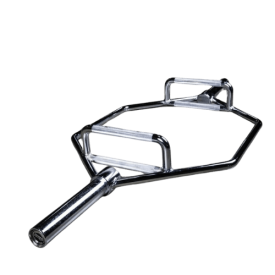
The raised handles and comfortable knurling across the PRx Performance Olympic Hex Bar make it a great entry-level profile for athletes. Plus, at 45 pounds, it can be easier to total up your working weight across heavy pulls and carries.
Specs
- Price: $229.99
- Weight: 45lbs
- Weight Capacity: 300lbs
- Sleeve Length: 9.5”
- Interior Space: N/A
- Knurling: Full
Pros
- A 45-pound bar weight is on par with a traditional barbell, making it an easier pickup for beginners and veteran athletes alike.
- The medium knurling across the 10-inch raised handles can provide a nice blend of control and comfort, perfect for longer carries.
- At roughly $230, this Olympic Hex Bar is below the $400 average of other profiles on the market.
Cons
- PRx Performance lists this bar’s weight capacity at 300 pounds, which may be too low for stronger athletes.
- Some athletes may prefer an open-style trap bar for extended movements like lunges.
[Read More: Best Lower Back Exercises for Strength and Reduced Pain]
For athletes wanting a unique way to increase muscle mass and develop their stabilizers, loaded carries and walks can be a great discipline, and trap bars are set up perfectly for the exercise needs. With the weights stacked toward each side, you can comfortably move through steps without wrenching areas like your lower back. The PRx Performance Olympic Hex Bar is our favorite hex bar for carries thanks to its raised handles with 10 inches of knurling. It also has a starting weight that’s nearly identical to what you’d get with a traditional barbell.
I’ve used this PRx Performance profile for carries and appreciate how the knurling pattern provides a good sense of control within my hands. This helped me lock into my positioning for extended routes, and I was easily able to keep the load stabilized throughout my steps. However, the knurling isn’t so aggressive that it tears my hands to shreds, which can help extend carry sessions. As such, I rated the knurling at 4.5 out of 5.
[Related: PRx Home Gym Review]
The PRx Performance Olympic Hex Bar is also a go-to of mine for carries thanks to its 45-pound bar weight. This is traditionally what standard barbells weigh, which can help make adding up the working totals less of a complicated math equation.
In terms of durability, I do have some concerns about this trap bar given the lack of information on the build quality. During use, I’ve yet to encounter any issues, but it’s always reassuring when you have some information set before you on the materials used and how structurally sound the makeup is.
Plus, a 300-pound weight capacity does infer that the materials aren’t as durable as other trap bars out there. I rated this Olympic Hex Bar at a conservative 3.5 out of 5, respectively.
Finally, another perk of this PRx Performance trap bar is the price point. This is one of the cheapest hex bars we found in testing and I like how the sub-$230 cost falls below the $400 average. If you’re hesitant about adding a trap bar to your workout setup, this can be an approachable trial run for less money.
[Related: 3 Variations to Make Farmer’s Carries More Fun]
Best Trap Bar for Deadlifts: Titan Fitness Open Trap Bar
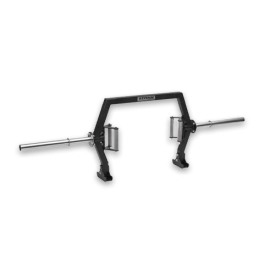
This Open Trap Bar from Titan Fitness packs in plenty of sturdiness and durability across its boxed tube design, and the integrated deadlift jack makes loading up for a heavy set more convenient than ever. Plus, this 88.5-inch length can be racked in your typical squat rack, which can be a great setup for heavy rack pulls or other rows.
Specs
- Price: $349.99
- Weight: 65lbs
- Weight Capacity: 1,500lbs
- Sleeve Length: 16”
- Interior Space: 23”
- Knurling: Full
Pros
- A built-in deadlift jack can make for easier loading and unloading up to the bar’s max 1,500-pound capacity.
- The rigid, durable design of this trap bar can be excellent for pulls, according to our tester.
- Each handle provides a tacky, grippable knurling pattern that helps ensure a sense of control throughout your lifts.
Cons
- The squared framing along this open-style hex bar does limit its versatility to just pulls and carries — cambered squats may be uncomfortable.
- The longer 88.5-inch profile can be cumbersome to store, according to our tester.
For athletes wanting to perform deadlifts in their workout regimen, yet want an easier pulling experience than that of a straight-bar deadlift, trap bars can be a quick solution. For our money, Titan Fitness’ Open Trap Bar takes the cake as a foundational deadlifting accessory by offering 16 inches of barbell sleeve at each side, giving you plenty of room to try and max out this profile’s 1,500-pound capacity.
Plus, our tester stated that the rigid steel framing has little give across the silhouette, showcasing excellent durability that’s primed for hard-nosed training day in and day out. As such, we scored the durability at 5 out of 5.
[Related: Trap Bar Deadlift vs Squats vs Leg Press]
The knurling pattern featured across the Titan Fitness Open Trap Bar also rated highly during trials at 5 out of 5 thanks to its medium-grade aggressiveness and comfortable yet tacky makeup. “Honestly, this may be my favorite knurling from any Titan Fitness product,” our tester noted. “There’s no loss of security once I grip the handles for a heavy pull. It’s very dialed-in for a setup that’s effective yet, at the same time, comfortable.”
This trap bar for deadlifts does fall into a more specialized category, though, given its squared framing. This may not influence your deadlift or carrying capacity, but can spell trouble if you planned to use this profile for other lifts like cambered squats. As such, we scored the versatility at 3.5 out of 5.
One other feature that makes this Titan Fitness trap bar a go-to for deadlifting is the built-in deadlift jack. You simply rotate the bar onto the built-in feet, which raises the barbell sleeves off the ground and can allow for seamless loading and unloading processes. While our tester did note that the height was a little excessive, leading to somewhat difficult turnovers into the loading position, the technology was convenient nonetheless.
[Related: The 12 Deadlifts Benefits You Need to Know About]
Best Multi-Grip Trap Bar: Kabuki Strength Trap Bar HD
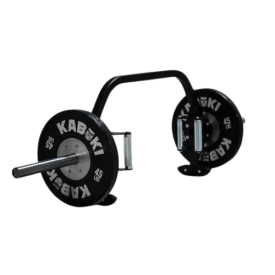
This impressive trap bar from Kabuki Strength featured interchangeable handles that can help give each set a new sense of challenge across your grip and forearms. Additionally, the rigid framing can support up to 1,500 pounds, which can be ideal when chasing down new PRs.
Specs
- Price: $749.99
- Weight: 66lbs
- Weight Capacity: 1,500lbs
- Sleeve Length: 17”
- Interior Space: Starting at 23”
- Knurling: Full
Pros
- You can swap out the available 1-inch, 1.5-inch, and 2-inch handles across the high and low placement for a unique sense of grip versatility.
- A squared frame tubing can help increase rigidity for better durability across heavy lifts.
- The 17-inch sleeve length is one of the longest we’ve seen in testing — other trap bars typically offer loading sleeves between 9 and 16 inches.
Cons
- The built-in bar jack is not rubberized, which can potentially damage your lifting platform or home gym flooring.
- At nearly $750, this is one of the more expensive trap bars available and higher than the $400 average cost.
Most trap bars offer low- and high-handle setups in today’s market, but the Trap Bar HD earns our praise for this ‘Best Multi-Grip’ moniker given the fact that the low and high handles can be interchanged to different diameters. Currently, Kabuki Strength offers a 1-inch, 1.5-inch, and 2-inch handle for this profile, which can be excellent for changing up your training intensity and forearm challenges while working through sets.
Additionally, our tester appreciated the fully-knurled pattern across each handle option, which gave them a good sense of grip whether pulling this open-style trap bar toward new PRs or maintaining their posture through carries and lunges. As such, we rated the features of the Trap Bar HD at 4.75 out of 5.
[Related: Everything You Need to Know About Deadlift Grips]
The Kabuki Trap Bar HD comes equipped with a built-in deadlift jack that can make loading and unloading plates a simpler endeavor. However, the feet of this feature aren’t rubberized, meaning the metal makeup can lead to unwanted scrapes and scuffs across your home gym flooring or lifting platform. We recommend taking extra precaution when transitioning this trap bar into a loading position so as to not damage your training environment.
In terms of construction, we scored this open-style trap bar at 4.75 out of 5, as well. The squared piping does add a greater sense of rigidity across the profile, which helps add some confidence behind the listed 1,500-pound weight capacity. However, this squared design does limit the trap bar’s use in other exercises, namely cambered squats.
Another feature of note across the Trap Bar HD is the lengthy 17-inch barbell sleeves. These components are longer than the average 9- to 16-inch units we’ve seen in other trap bars, which can be great for taking your training PRs to new heights.
“This allowed me to load this trap bar with plenty of iron plates,” added our tester. “I could even stack up bumper plates to my liking, which is virtually unfeasible with other trap bars I’ve trialed in the past.”
At nearly $750, the Kabuki Trap Bar HD is not exactly budget friendly, especially when the average cost of trap bars hovers around $400. If you’re looking for a unique vessel offering different grip styles for intensified training, though, this profile is definitely worth considering.
[Related: Do Different Row Grips Matter?]
Best Budget Trap Bar: CAP Barbell Olympic Trap Bar
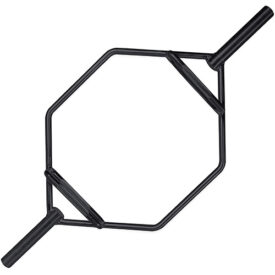
This trap bar weighs 52 pounds and measures 55.71 inches long. The knurled handles each have a diameter of 25 millimeters and there are raised and flush grip options available.
Specs
- Price: $158.48
- Weight: 52lbs
- Weight Capacity: 750lbs
- Sleeve Length: 9”
- Interior Space: 25”
- Knurling: Full
Pros
- At less than $160, this is well below the $400 average we’ve seen for trap bars.
- You have the option between a black powder coat and chrome finish for an additional sense of personality across your strength-training equipment.
- The 25-inch interior space can be more accommodating for wider athletes.
Cons
- The short sleeves span 9 inches, which can be more easily maxed out once loaded down with bumper plates.
- Athletes looking to use their trap bar for extended exercises such as lunges may prefer an open design as opposed to this bar’s closed hexagonal silhouette.
Sure, trap bars and hex bars aren’t the most expensive pieces of fitness equipment you can add to your garage gym, but a good deal is always appealing, right? With a weight capacity of up to 750 pounds, as well as the option between black powder coat and chrome finishes for a touch of style, the CAP Barbell Olympic Trap Bar is our favorite profile for budget-minded individuals.
I’ve been rostered at multiple gyms where this trap bar is the lone option and have yet to experience any major issues with the design. Yes, the sleeves are shorter than other trap bars at 9 inches, meaning you can’t load this profile to the heavens for heavy pulls and PRs. However, the 750-pound weight capacity is notable in terms of durability, especially when you take into account that other, more expensive trap bars can sometimes feature a lower load rating.
I did score this CAP Barbell profile at 3.75 out of 5 for versatility, though, given its closed design. I’ve never had issues when performing your traditional deadlift or farmer’s carry, but the enclosed interior has left me cramped and confined at times, limiting my ability to perform lunges or other modalities.
[Related: Learn Rack Pulls for More Pulling Strength and a Bigger Back]
Additionally, I rated the knurling at 3.75 out of 5. Sure, there is some texture across the neutral handles, and I do like how CAP Barbell offers both low and high profiles for an added sense of customization during setups.
However, I’ve noticed that the knurling pattern is more passive than other barbells and trap bars I’ve worked out with over the years, and finding that optimal grip can be a challenge more often than not — especially with older bars that may feature a worn-down pattern. If you’re looking to perform heavy sets with this trap bar, I highly suggest adding some of the best lifting straps to your setup to achieve that more locked-in feel.
Still, though, you cannot overlook the value at play with this trap bar, which I rated at 5 out of 5. You can pick up one of these CAP Barbell trap bars for less than $160 — a far cry from the average $400 price tag associated with other trap bars of note.
[Related: Best Budget Home Gym Equipment]
Best Hex-Style Trap Bar: Rogue Fitness TB-2 Trap Bar
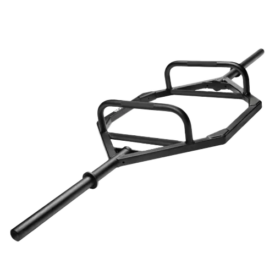
This trap bar features two sets of fully knurled handles for you to workout with. One set of handles are raised, and sit 8.25 inches off the ground, while the other set are level with the frame of the bar to increase your range of motion.
Specs
- Price: $395
- Weight: 60lbs
- Weight Capacity: N/A
- Sleeve Length: 16”
- Interior Space: 25”
- Knurling: Full
Pros
- This hex bar features 16-inch bar sleeves for extra room for weight plates and a rackable design for more efficient plate loading and lift-offs.
- The 25 inches of interior space can be more accommodating for wider athletes.
- The squared frame piping and high-quality welds can be excellent for rigidity and durability over extended training sessions.
Cons
- A lengthier profile can be a burden when it comes time to store it.
- According to Rogue, this trap bar is best paired with Rogue-branded Axle barbell collars, which may require an extra purchase.
When thinking of a trap bar or hex bar, odds are that your mind goes to a hexagonal profile with loads of weight plates on each end ready for a heavy pull or carry. While innovations have lent themselves to more open styles, this enclosed silhouette can still be appealing to plenty of athletes, and if you’re looking for the best of the bunch, the TB-2 Trap Bar from Rogue Fitness is tough to beat.
According to our tester, this hex bar showcased no whip or bend during training, which is a testament to its durability and rigidity. Granted, Rogue doesn’t list the tested weight capacity of the TB-2 online, but our tester remarked that they wouldn’t be surprised at this bar handling over 1,000 pounds with ease.

Plus, the lengthier barbell sleeves can make loading toward your desired total a breeze. “Other trap bars can oftentimes feature a 9-inch sleeve, which caps how many plates you can fit across each profile,” noted our tester.
The TB-2 also features a full black powder coat across the entire silhouette — even the sleeves. We did dock the construction of the bar down to 3.75 out of 5 because the powder coat can easily be scraped away after loading just a few weight plates for training. Granted, we’re not too worried about the aesthetics, but the exposed metal can lead to potential rust and corrosion, especially if you’re storing your Rogue trap bar in a damp basement or less-climate-controlled environment.
[Related: Use the Trap Bar Deadlift to Build Strength and Size From the Ground Up]
Additionally, we like how spacious the interior of this TB-2 is, boasting 25 inches in-between the handles. With average shoulder widths measuring 17.4 inches, this can give plenty of athletes enough room to find that ideal grip for worthwhile pulls and carries. (2)
Finally, we do appreciate the rackable nature of this 88.5-inch profile, which can allow for more efficient loading processes and lift-offs. However, we caution those lifting in tighter quarters to consider their available storage space — this Rogue silhouette, according to our tester, can be a burden when it comes time to clean up for the day.
Read our full Rogue TB-2 Trap Bar Review.
Best Open-Style Trap Bar: GIANT Northland Open Trap Hex Bar
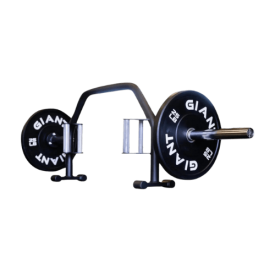
An open-style trap bar can be ideal for extended movements like lunges, and this GIANT Northland Open Trap Hex Bar is one of our favorites given its lengthy 16-inch sleeves, full knurling across the handles, and roomy 25-inch interior that can accommodate a plethora of athletes and body types.
Specs
- Price: $329.99
- Weight: 45lbs
- Weight Capacity: 800lbs
- Sleeve Length: 16”
- Interior Space: 25”
- Knurling: Full
Pros
- The open design can allow for easier entry and exit, while also supporting the longer stances required for lunges and other movements.
- This bar’s 45-pound starting weight can help you easily calculate working totals.
- A built-in bar jack can be great for unloading and loading plates without much strain.
Cons
- Our tester noted they experienced balance issues during heavier sets.
- The non-removable handles can intrude on your form when using this open trap bar for cambered squats and other movements.
Open-style trap bars can be great for those wanting to upgrade their hex bar workouts with easier entry and exit, as well as a heightened range of motion for extended exercises like lunges. Open trap bars can also sometimes be used as cambered squat bars, adding to the versatility. The GIANT Northland Open Trap Hex Bar can be an excellent pick from the category thanks to its built-in bar jack, 45-pound starting weight, and approachable price point.
According to our tester, this GIANT Northland trap bar can be a great introduction to open trap bars given its lower-than-average price. Typically, you can expect to pay roughly $400 for a similar profile, whereas the GIANT Northland Open Trap Hex Bar comes in at nearly $330. As such, we rated the value at 5 out of 5.
In addition to the more approachable costs, this trap bar weighs 45 pounds — a common figure that most strength athletes will be used to. “This took the guesswork out of my gym math,” said our tester. “I could add up my totals rather quickly, similar to how I would when benching or squatting with a traditional barbell.”
We also appreciated the medium-grade knurling across the handles, scoring the trap bar at 4 out of 5 for the category. The traction across our palms and fingers was tacky yet comfortable, which was a true benefit during longer sessions and carries.
However, we do wish the handles were removable like other hex bars we’ve tried. This could help with positioning and comfort when using the GIANT Northland as a cambered squat bar. Respectively, we scored this open trap bar at 3.5 out of 5 for versatility.
Another detriment to this bar’s versatile nature is its balance. The built-in bar jack can be helpful when loading plates up to the 800-pound max capacity, but the legs can do little for counterbalancing the profile once you pick it up. According to our tester, this can create a dumping sensation that pulls you forward or back, depending on where you have the opening.
[Related: Best Barbell Exercises]
How We Tested and Chose the Best Trap Bars
The BarBend team is made up of competitive athletes, certified personal trainers, and lifelong fitness enthusiasts. To make our list of the best trap bars, we got hands-on with 15 different silhouettes from top brands, using a multi-point methodology to rate each profile on a scale of 1 (lowest) to 5 (highest) to determine our top picks. Below are some of the categories and components we looked at to make our list.
Weight Capacity
Trap bars themselves can weigh anywhere from 45 pounds to 65 pounds or more. While this metric is definitely worth keeping in mind when tallying up your weightlifting totals, the bar’s weight capacity can be a better determiner of its training capabilities. Higher capacities typically infer a stronger build quality, which can be great for stronger athletes eyeing high workout totals, while lower max weights can often come with a cheaper price tag overall.
We examined multiple trap bars at varying weight capacities, doing our best to find suitable silhouettes that were sturdy enough for heavy-duty training without completely blowing our budget. All the trap bars included in this guide can support working weight totals of at least 700 pounds, with some featuring rock-solid profiles that can comfortably handle double that for some serious PR potential.
Interior Space
Given the body positioning at play with trap bars, the weights are distributed out toward your side — unlike what you’d experience with a traditional barbell that distributes the load out in front. To keep this unique stance as comfortable as possible, you’ll want to opt for a trap bar — also known as a hex bar for its hexagonal design — with enough interior space to house your frame.
The distance between the handles can vary from brand to brand, but we kept our findings to bars featuring at least 22 inches of interior space. These dimensions can accommodate the average shoulder width (17.4 inches) with some room to spare for grip placement and widened stances. (2) Of course, though, wider athletes may want to opt for a larger trap bar with a more spacious interior.
Handle Design
Your trap bar’s handle design will also play heavily into your experience with this specialized home gym essential. All of the trap bars included in this round-up feature handles that sit perpendicular to the weights — think of you lifting the bar as you would two suitcases at your sides. However, some options can also feature angled grip points for a more unique setup.
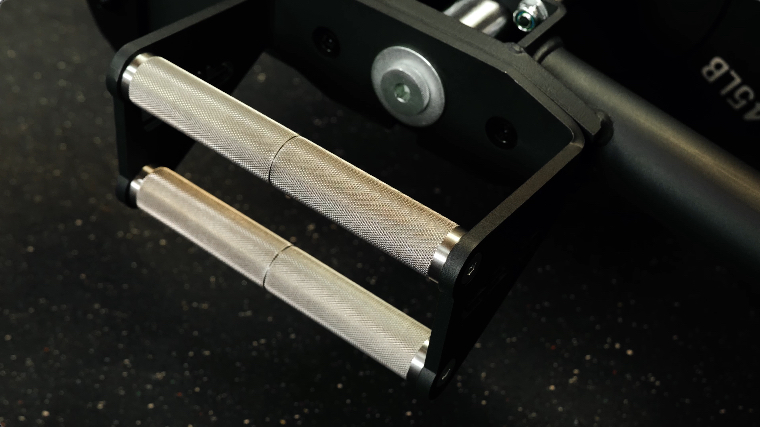
Additionally, we’ve included some hex bars featuring multiple handles across their frames that can influence your range of motion and how much the bar needs to travel through a given repetition. Higher-sitting handles can cut the distance slightly from rest to lockout, while lower grips can be great for mixing up your training intensity. Some trap bars also offer different options in terms of handle spacing, which can be great for those that need more or less interior space for a comfortable stance.
Lastly, all of the trap bars in this round-up feature knurled handles, with most of them boasting a fully-knurled design for optimal grip. We also made sure to call out when a silhouette featured aggressive knurling, and when the pattern was less abrasive across our hands.
We’re always going to promote knurling when it comes to barbells, as the cross-hatched pattern can be excellent for promoting better control and confidence throughout a given rep. However, some athletes may prefer a trap bar without such markings, so be sure to consider your personal preferences before purchase.
Quality and Materials
The best home gym equipment should be durable and ready to be used for extended periods. Trap bars are no different. We looked for hex bar designs featuring high-quality components, including steel frames and precise welds that could withstand heavy weight totals and regular use across our training sessions.
Additionally, we examined whether there were warranty packages tied to each profile, which can go a long way in ensuring your workout setup is equipped with trustworthy equipment day in and day out.
Value
As stated above, your trap bar’s price can be indicative of its quality, but there are still some budget-minded profiles on the market that can deliver worthwhile performance without the extra costs. Additionally, expensive doesn’t always mean quality with fitness equipment, so we tried to keep our picks within reason, pulling profiles from trusted brands that we know to showcase premium craftsmanship across their goods.
From our findings, you can expect to find worthwhile trap bars as low as $230 and as high as $970, with many silhouettes coming in around the $400 mark. Naturally, costs can vary from brand to brand, but this can be a good starting point for those on the search for a more specialized fitness tool for easier deadlifts and carries.
Bar Shape
Yes, hex bars get their name from the traditionally hexagonal shape showcased across the middle of the profile, but today’s engineering has allowed brands to experiment with open designs that can allow for easier entry and exit in between reps.
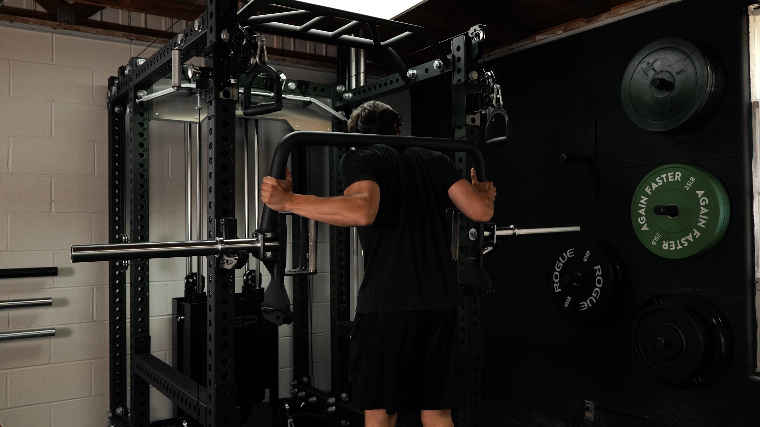
According to BarBend expert reviewer Amanda Capritto, CPT, CES, CNC, CF-L1, CSNC, “Open hex designs are more versatile, as you can do more than just deadlifts, rows, and trap raises with them. You can, for instance, do overhead presses, triceps extensions, reverse lunges, and Romanian deadlifts with an open hex design.
“You may be able to perform these lifts with a closed design, too, but my opinion is that it’s generally a bit more difficult and requires more knowledge of movement patterns and proper loading. Additionally, the open design is easier to step in and out of.” As such, we’ve made sure to include both closed and open trap bars in this guide.
[Related: Different Types of Barbells]
Benefits of Trap Bars
According to Amanda Capritto, CPT, CES, CNC, CF-L1, CSNC, “This type of barbell repositions your body in relation to the external load and manufactures a different experience compared to a straight barbell.” As such, this unique body positioning can unlock a number of benefits, especially for those new to certain exercises or athletes dealing with lower back pain. Below are a few of our favorite perks associated with trap bars and how they can influence your workouts for the better.
Less Stress Across the Spine
One of the main benefits associated with trap bars, according to Capritto, is how the weight distribution and neutral, higher hand placement can influence your spine and lower back during deadlifts.
“Due to both your body positioning in relation to the external load (the load is more centered toward your midline) and the elevated handles, your deadlift begins from a more upright position and reduces the odds that your spine strays from a neutral (and safe) position,” she says.
[Related: The Hip Hinge Will Make Or Break Your Big Lifts. Here’s How to Do it]
This more approachable and comfortable movement plane can be excellent for beginner lifters learning the ins and outs of hip-hinging modalities, as well as those dealing with soreness or injury across their lower back.
Centered Load Distribution
When setting up for a pull inside a trap bar, the weight is centered across your midline and placed at your sides, rather than out in front of you as with a traditional straight-bar deadlift. This weight distribution, according to studies, can be more advantageous for athletes, taking the strain out of the lower back and allowing you to lift more naturally. (1) This, in turn, is why trap bar deadlifts may feel easier than a normal deadlift.
Versatility Beyond Deadlifts
While Capritto notes that trap bars are less versatile than their standard barbell counterparts, there are still plenty of exercises that can be performed with these uniquely-shaped fitness tools. Aside from deadlifts, hex bars can also be useful for carrying exercises and common rows.
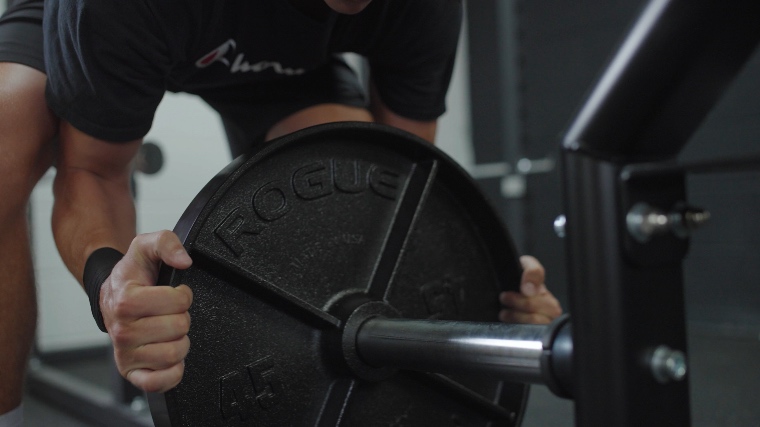
If you’re looking to set up for presses or shrugs, there are also trap bars capable of a racked position within your power rack or squat cage, too. However, these profiles are inherently longer than others and can be cumbersome to store, so be sure to take your available space into account if you’re looking to combine your power rack regimen with a trap bar.
Caring for your Trap Bar
To keep your trap bar in tip-top condition, there are some maintenance requirements that should be addressed on a semi-regular schedule:
- Using a brush, make sure to clear the knurling patches of any chalk, dust, or debris.
- Wipe down the bar with a gentle cleanser, and then give it a light coat of oil. Leave this overnight to sink in.
- Check the sleeve to see if the bearings are in good condition (if applicable). Some bearings will need oil while others won’t. You’ll need to check with your manufacturer whether your bar is the former or the latter. Most trap bars have fixed sleeves that don’t rotate, so this may not apply to your trap bar.
How often you have to do these steps will depend on the metal used to make the bar, the climate you live in, and how often you use the bar. Cheaper bars made out of budget chrome or zinc will require more regimented maintenance — typically on a monthly cadence. Stainless steel and other, more expensive options will need less frequent checks, usually every few months.
Of course, your climate can also influence your trap bar care, as more humid conditions can potentially lead to rust and corrosion, while dry environments should have less worry. In the end, a proper maintenance schedule is necessary to keep your gear in working condition.
[Related: How to Clean Home Gym Equipment]
How Much Do Trap Bars Cost?
Trap bars are more specialized than your average barbell, but you can still find affordable silhouettes across the market. On average, you can expect to pay roughly $400 for a high-quality hex bar for your home gym. Below are the trap bars included in this guide, and how their price tags compare to one another.
| Best Trap Bar Overall | REP Fitness Open Trap Bar | Starting at $399.99 |
| Best Trap Bar with Elevated Handles | Bells of Steel Open Trap Bar/Hex Bar 3.0 | $299.99 |
| Best Rackable Trap Bar | Titan Fitness Rackable Hex Trap Bar V3 | $329.99 |
| Best High-End Trap Bar | Eleiko Öppen Bar | $970 |
| Best Trap Bar for Carries | PRx Performance Olympic Hex Bar | $229.99 |
| Best Trap Bar for Deadlifts | Titan Fitness Open Trap Bar | $349.99 |
| Best Multi-Grip Trap Bar | Kabuki Strength Trap Bar HD | $749.99 |
| Best Budget Trap Bar | CAP Barbell Olympic Trap Bar | $158.48 |
| Best Hex-Style Trap Bar | Rogue Fitness TB-2 Trap Bar | $395 |
| Best Open-Style Trap Bar | GIANT Northland Open Trap Hex Bar | $329.99 |
Of course, prices can differ depending on the amount of features. Classic, closed designs with standard raised handles can often be your cheapest option, while open bars with different trap bar features — variable handles, built-in bar jacks, and longer barbell sleeves — will up the total. As always, it’s best to weigh your finances before deciding on a trap bar profile — if you can afford the equipment comfortably, odds are you’ll be more comfortable using the device in training.
How to Choose the Best Trap Bars
As with any piece of home gym equipment, there are a few key factors worth thinking through when deciding between one trap bar or the next. Outside of the bar’s actual silhouette, as well as its price point, below are a few items we recommend considering before adding a high-quality profile to your cart.
Bar Design
Amanda Capritto, CPT, CES, CNC, CF-L1, CSNC, our expert reviewer, states that the first thing to consider when looking for a trap bar is which design will suit your training style best — open or closed. “Open hex designs are more versatile, as you can do more than just deadlifts, rows, and trap raises with them,” she states.
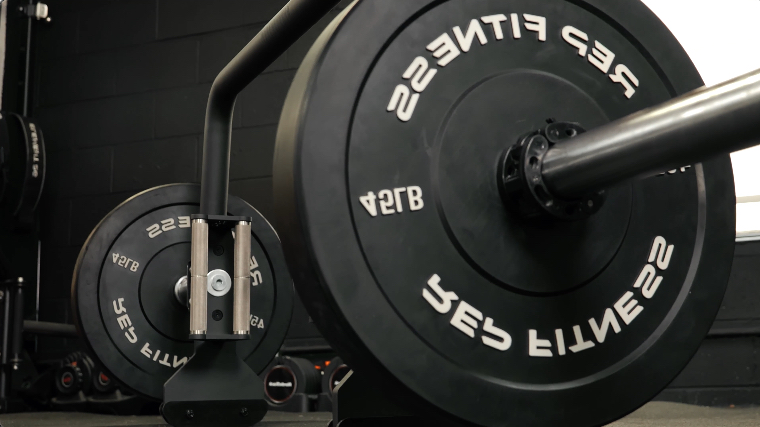
“You can, for instance, do overhead press, triceps extensions, reverse lunges, and Romanian deadlifts with an open hex design,” she says. “You may be able to perform these lifts with a closed design, too, but my opinion is that it’s generally a bit more difficult and requires more knowledge of movement patterns and proper loading.”
Knurling
Knurling refers to the crosshatched pattern across the handles that’s put in place to help improve grip and control during lifts. Most trap bars have a medium knurling, meaning the area is abrasive but not overly aggressive. How intense your knurling is can be subjective, so think about how much grit and abrasiveness you prefer across your palms during training.
Sleeve Length and Weight Capacity
Your trap bar’s weight capacity can influence how much weight you can actually lift in a given set. This metric can also be an inference toward the bar’s durability — more stable, supportive bars are often more structurally sound.
Your required weight capacity depends highly on your lifting capabilities and your future goals. You can find trap bars with weight ratings as low as 300 pounds and as high as 1,500 pounds. Think about how you intend to train and opt for a profile that can accommodate your totals best.
In addition to weight capacity, your trap bar’s sleeve length can also influence how heavy you’re able to go in training. Shorter sleeves can leave less room for plates across each side, regardless of the listed weight capacity. This can be troublesome for those training with thicker bumper plates that can take up more surface area across the design. On average, you can expect to find trap bars with sleeves ranging from 9 to 16 inches.
[Related: Best Weight Plates]
Raw Materials and Finish
Bars are almost always going to be made from steel. However, the quality of steel can vary and this is what leads to varying degrees of strength for different trap bars. Other important materials to look for are the bearings or bushings, and the finish if your trap bar has rotating sleeves.
Generally, for the finishes, stainless steel and cerakote are going to be the most expensive, but also the most resistant to wear and tear. At the opposite end of the spectrum, bare steel, budget chrome, and black oxide are going to be cheaper, but also less resilient.
Price
Hex bars are, by definition, a specialty bar, so you can expect for prices to be dissimilar to what you’d see when searching for a traditional straight barbell. On average, though, you can expect to pay between $150 and $1,000 for one of these silhouettes, with many of the best trap bars costing around $400.
Naturally, features including a built-in jack, interchangeable handle diameters, more rigid frames, and other factors can influence the price, but these are the financial metrics we’ve found most common across the category.
Our Experts Final Word
Trap bars can be a great tool for working on the mechanics of your deadlift and an invaluable one for those who are undergoing rehabilitation for a wide array of injuries. They can also be great for teaching a hip hinge to beginners, or strengthening the lockout of a deadlift if your trap bar has elevated handles.
When looking for a trap bar, it’s important to consider the profile’s sleeve length and weight capacity, as these components can greatly influence how heavy your sets can be during training. Additionally, you should think about whether a closed or open design is best for your specific workout needs. Using this round-up as a guide, you can be well on your way to outfitting your home gym with a new, interesting piece of strength training gear.
FAQs
Should I buy a trap bar or a conventional barbell?
The choice really depends on which sport you’re training for. If your sport involves using a conventional barbell, such as powerlifting or strongman, then you may want to get a conventional barbell and train with a trap bar as supplemental training. If you compete in any other type of sport, or just use training as a means for general fitness, then it really comes down to personal preference.
What is the best trap bar?
There are tons of different and innovative designs out there for trap bars. Our favorite at the moment is the REP Fitness Open Trap Bar. It’s extremely versatile, well-built, and not absurdly priced for the quality of the bar. It may be a bit more pricey than some other options, but if you can afford it, the improved usability is worth it.
How much do trap bars cost?
Trap bars aren’t the cheapest pieces of gym equipment, but thankfully, they’re not the most expensive, either. On average, high-quality hex bars can cost roughly $400, with cheaper and more expensive options rounding out the category.
When should I use a trap bar?
Much like debating between purchasing a trap bar or a conventional bar, the answer depends on your fitness goals and how you want to structure your training regimen. Trap bars are great for jump squats, deadlifts, carries and even rows. However, experimenting with different exercises can be a great way to decide when to substitute the trap bar in for a conventional barbell.
References
- Lake, J., Duncan, F., Jackson, M., & Naworynsky, D. (2017). Effect of a hexagonal barbell on the mechanical demand of deadlift performance. Sports, 5(4), 82. https://www.ncbi.nlm.nih.gov/pmc/articles/PMC5969032/
- Lindner, J. (2024, February 7). Statistics about the average shoulder width • Gitnux. GITNUX. https://gitnux.org/average-shoulder-width/